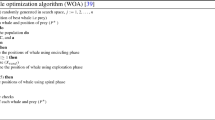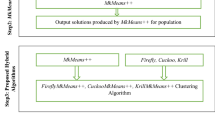Abstract
Big Data analysis is the era of goliath measures of data more than a brief stage like social tagging framework. Social tagging frameworks such as BibSonomy and del.icio.us have turned out to be progressively famous owing to their across-the-board utilization of the web. The social tagging framework could be typical on account of the comments on web 2.0 resources. The social tagging frameworks allow the web clients to clarify distinctive types of web resources with free-form tags. Labels are broadly used to translate and arrange the web 2.0 resources. Tag clustering is characterized as a gathering procedure that implies that the comparable labels are assembled into groups. Tag clustering is exceptionally valuable for sorting out and seeking the web 2.0 resources. Furthermore, it is essential for achieving social tagging frameworks. The objective of feature selection is to decide upon a negligible bookmarked URL subcategory from Web 2.0 data while remembering with reasonably high exactness when speaking to the first bookmarks. In this study, Unsupervised Quick Reduct feature selection calculation is connected so as to locate an arrangement of most frequently tagged bookmarks. Furthermore, clustering techniques such as the Unsupervised Quick Reduct Particle Swarm Optimization (UQRPSO) algorithm are applied for clustering the selected tagged bookmarks, and this algorithm is then compared with k-means clustering (k-means), bat algorithm, and firefly algorithm.







Similar content being viewed by others
References
Keller, R.M., Wolfe, S.R., Chen, J.R., Rabinowitz, J.L., Mathe, N.: A bookmarking service for organizing and sharing URLs. In: Selected papers from the sixth international conference on World Wide Web, Santa Clara, CA, USA, pp. 1103–1114 (1997)
Marais, H., Bharat, K.: Supporting cooperative and personal surfing with a desktop assistant. 10th annual ACM symposium on user interface software and technology, Banff, Alberta, Canada, October 1997. UIST ‘97. ACM Press, New York, p. 129 (1997)
Grzymala-Busse, J.W.: LERS-a system for learning from examples based on rough sets. In: Slowinski, R. (ed.) Intelligent Decision Support, pp. 3–18. Kluwer Academic Publishers, Dordrecht (1992)
Das, S.K.: Feature selection with a linear dependence measure. IEEE Trans. Comput. 20(9), 1106–1109 (1971)
Han, J., Hu, X., Lin, T.-Y.: Feature subset selection based on relative dependency between attributes. In: Proceedings of the 4th international conference on rough sets and current trends in computing, Uppsala (2004)
Dash, M., Liu, H.: Unsupervised feature selection. In: Proceedings of the Pacific and Asia conference on knowledge discovery and data mining, Kyoto (2000)
Pal, S.K., De, R.K., Basak, J.: Unsupervised feature evaluation: a neuro-fuzzy approach. IEEE Trans. Neural Netw. 11(2), 366–376 (2000)
Mitra, P., Murthy, C.A., Pal, S.K.: Unsupervised feature selection using feature similarity. IEEE Trans. Pattern Anal. Mach. Intell. 24, 1–10 (2002)
García-Plaza, A.P., Zubiaga, A., Fresno, V., Martinez, R.: Reorganizing clouds: a study on tag clustering and evaluation. Expert Syst. Appl. (2012). https://doi.org/10.1016/j.eswa.2012.02.108
Alibeigi, M., Hashemi, S., Hamzeh, A.: Unsupervised feature selection using feature density functions. Int. J. Comput. Electr. Autom. Control Inf. Eng. 3(3), 847–852 (2009)
Ramage, D., Heymann, P., Manning, C.D., Garcia-Molina, H.: Clustering the tagged web. In: Proceedings of the Second ACM International Conference on Web Search and Data Mining, pp. 54–63. ACM, New York (2009)
Tang, J.: Improved k-means clustering algorithm based on user tag. J. Conv. Inf. Technol. 5(10), 124–130 (2010)
Tu, C.-J., Chuang, L.-Y., Chang, J.-Y., Yang, C.-H.: Feature selection using PSO-SVM. Int. J. Comput. Sci. 33(1), 111–116 (2007)
Jothi, G., Inbarani, H.H.: Soft set based quick reduct approach for unsupervised feature selection. In: International Conference on Advanced Communication Control and Computing Technologies, pp. 277–281. IEEE (2012)
Saraswathy, V.R., Kasthuri, N., Kavitha, K.: Enhancing quick reduct algorithm for unsupervised based network intrusion detection. ARPN J. Eng. Appl. Sci. 10(9), 3936–3940 (2015)
Durairaj, M., Sivagowry, S.: An intelligent hybrid quick reduct particle swarm optimization algorithm for feature reduction in cardiac disease prediction. Int. J. Emerg. Technol. Comput. Appl. Sci. 12(2), 163–173 (2015)
Parveen, A.N., Kumar, E.S.: Performance Analysis of Unsupervised Feature Selection Methods. Periyar University. https://pdfs.semanticscholar.org/9fbb/28428ffdec6c4e51829fd30a6e4a4bb09792.pdf
Velayutham, C., Thangavel, K.: Unsupervised quick reduct algorithm using rough set theory. J. Electron. Sci. Technol. 9(3), 193–201 (2011)
Acknowledgment
The authors extend their appreciation to the Deanship of Scientific Research at King Saud University for funding this work through research Group No. (RG-1438-027).
Author information
Authors and Affiliations
Corresponding author
Rights and permissions
About this article
Cite this article
Tolba, A., Elashkar, E. Soft computing approaches based bookmark selection and clustering techniques for social tagging systems. Cluster Comput 22 (Suppl 2), 3183–3189 (2019). https://doi.org/10.1007/s10586-018-2014-5
Received:
Revised:
Accepted:
Published:
Issue Date:
DOI: https://doi.org/10.1007/s10586-018-2014-5




